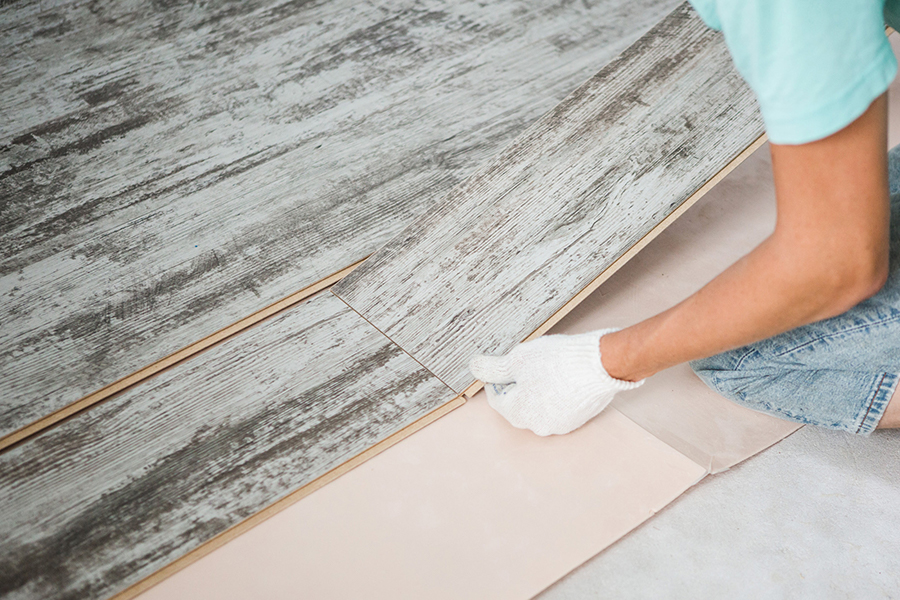Vinyl plank flooring comes in a range of styles and materials. It can suit residential and commercial applications. How can you choose the right type for your needs?
Join us as we have a look at the different types of vinyl flooring.
Types of vinyl plank flooring on the market
Vinyl plank flooring falls into three main groups. These are:- luxury vinyl planks (LVP)
- stone-plastic composite vinyl planks (SPC)
- wood-plastic composite vinyl planks (WPC).
They all offer great features, and we can’t say that one is better than the other. It will depend on where you want to use them, and how your family will use them.
Luxury vinyl planks (LVP)
Luxury vinyl planks offer people a chance to get the look of hardwood, at a fraction of the cost.They come in planks, which adds to the hardwood-like appearance. Also, they feature very realistic wood designs and come in a huge range of styles. Most of them are water-resistant, and some of them are truly waterproof.
This makes them suitable for a wide range of applications, even in bathrooms. This means that you can get a realistic hardwood look in places it wasn’t possible before.
Achieving a luxurious feel
There’s no industry standard for the word ‘luxury’. If you’re shopping for luxury vinyl planks, pay close attention to how they are laid.Some planks, especially cheaper ones, may simply glue directly onto the concrete subfloor. This makes them cold and you will be able to feel any imperfections in the subfloor underfoot.
Some versions are known as engineered vinyl planks. These planks are thicker and waterproof, and they provide more cushioning and insulation beneath. This makes them much more pleasant to walk on.
The wood designs on the vinyl plank flooring are also embossed. This gives the feel of the natural grain of wood underfoot, adding to the natural appearance. They often look more realistic than laminate flooring.
Where to use luxury vinyl planks (LVP)
Luxury vinyl planks are hardwearing and realistic. This makes them great for high-traffic areas in the home.The waterproof versions are great for kitchens, bathrooms, laundry rooms, or anywhere spills are likely! They’re easy to keep clean and won’t warp or discolor over time.
Google ‘flooring store near me’ or ‘laminate store near me’ to find local stockists of luxury vinyl planks.
Stone-plastic composite vinyl planks (SPC)
Stone-plastic composite vinyl planks are a real game-changer in the flooring world. They’re made from a rigid core, that comprises mostly of limestone mixed with polyvinyl chloride.Their superstrong and waterproof core makes this product extremely hard wearing and waterproof.
Don’t be put off by the use of stone in the name. While you can get floor tiles with a stone effect finish in this material, these vinyl planks come with a range of hardwood effect finishes.
Where to use stone-plastic composite vinyl planks (SPC)
You can use these planks in all parts of the house. They’re particularly suited to high-traffic areas, such as hallways and playrooms.They also hold-up extremely well in laundry rooms, basements, kitchens, bathrooms, and other areas that get warm and wet.
Wood-plastic composite vinyl planks (WPC)
Wood plastic represents an innovation in vinyl plank flooring. Similar to stone-plastic vinyl flooring, it combines two materials to create a rigid, strong core for the planks.In this case, the core is a mixture of recycled wood pulp and plastic. This composite material is very strong and rigid, similar to a laminate board. The top vinyl later is thick and embossed. This gives you the positive attributes of laminate without its weaknesses.
Like other types of vinyl plank flooring, it is waterproof and super easy to clean and maintain. It’s also installed as a floating floor system, meaning that it can be laid over other flooring if desired.
The use of wood allows for a little give in the material. This makes it a pleasure to walk on. It can even be laid without underlayment.
A competent DIYer should be able to lay this flooring without too much difficulty. But to make sure you get a really high-end finish, it’s always a good idea to get the professionals in.
Where to use wood-plastic composite vinyl planks (WPC)
This flooring is dent resistant, but it is not quite as hardy as the stone-composite version. For that reason, it’s better to use it in areas that get less footfall.Where it really shines is that it is a wood product that is truly waterproof. Although you do not see the natural wood, you get the look. It can provide the appearance of hardwood right where you don’t expect it – in the bathroom and mudroom.
Which type is right for me?
Search for a flooring store near me that can supply this material. Discuss your project with the flooring store team. They will be able to recommend the most suitable type of vinyl plank flooring for your project.Find the perfect vinyl plank flooring for your project
Vinyl plank flooring is a great choice for your next flooring project. Whether it’s commercial or residential, vinyl plank flooring is hard-wearing and looks great. Plus it comes at a fraction of the cost of hardwood!Would you like to find floor stores near me or floor tile stores near me that stock these products? Look no further. Y’s Way Flooring has flooring stores in the Watertown, Lake Mills, and Oconomowoc, Wisconsin areas.








